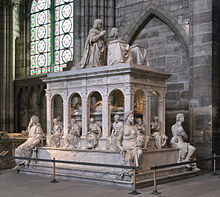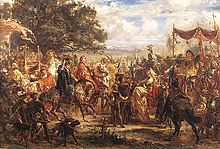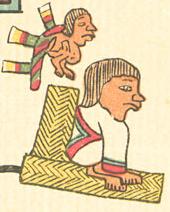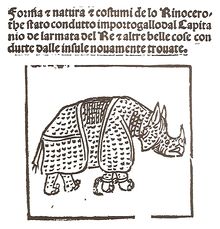1515
Portal history | Portal Biographies | Current events | Annual calendar
◄ |
15th century |
16th century
| 17th century
| ►
◄ |
1480s |
1490s |
1500s |
1510s
| 1520s
| 1530s
| 1540s
| ►
◄◄ |
◄ |
1511 |
1512 |
1513 |
1514 |
1515
| 1516
| 1517
| 1518
| 1519
| ►
|►►
| 1515 | |
|---|---|
|
In St. Stephen finds double wedding in Vienna instead. |
Francis I becomes King of France . |
| France defeated the Confederates in the battle of Marignano , who then declared themselves “ forever neutral ”. | |
| 1515 in other calendars | |
| Armenian calendar | 963/964 (turn of the year July) |
| Ethiopian calendar | 1507/08 |
| Aztec calendar | 9. Rabbit - Chicuhnahui Tochtli (until the end of January / beginning of February: 8th house - Chicuei Calli ) |
| Buddhist calendar | 2058/59 (southern Buddhism); 2057/58 (alternative calculation according to Buddhas Parinirvana ) |
| Chinese calendar | 70th (71st) cycle
Year of the wood pig乙亥 ( at the beginning of the year wood dog 甲戌) |
| Chula Sakarat (Siam, Myanmar) / Dai calendar (Vietnam) | 877/878 (turn of the year April) |
| Dangun era (Korea) | 3848/49 (October 2/3) |
| Iranian calendar | 893/894 |
| Islamic calendar | 920/921 (turn of the year 14/15 February) |
| Jewish calendar | 5275/76 (9/10 September) |
| Coptic calendar | 1231/32 |
| Malayalam calendar | 690/691 |
| Seleucid era | Babylon: 1825/26 (turn of the year April)
Syria: 1826/27 (turn of the year October) |
| Spanish era | 1553 |
| Vikram Sambat (Nepalese Calendar) | 1571/72 (turn of the year April) |
Events
Politics and world events
France
After a long illness, the French King Louis XII dies . , the last member of the House of Valois-Orléans without male descendants on January 1st . He was succeeded by Francis I , a distant cousin from the Valois family , the only son of Charles de Valois, comte d'Angoulême and Luise of Savoy , who was anointed and crowned by Archbishop Robert de Lénoncourt on January 25th in Reims Cathedral becomes. Francis I ended the time of the Loire kings domestically and began building absolutism in France by means of centralization .
- March 24th : In the Treaty of Paris , a future engagement of the almost 15-year-old Spanish Infante Carlos , also Count of Flanders , who was declared of legal age on January 5th at the request of the Dutch States General , to Princess Renée de France , the four-year-old Daughter of King Ludwig XII. and agreed by Anne de Bretagne .
Wars of Milan and the Old Confederation
- January: Giuliano di Lorenzo de 'Medici , city lord of Florence , marries Philippa of Savoy , an aunt of the French king François I , and becomes Duke of Nemours . In the same year, however, he fell seriously ill and was henceforth represented in all matters by his nephew Lorenzo di Piero de 'Medici .
- September 7th : Ottaviano di Campofregoso has to recognize the supremacy of France over the Republic of Genoa . His Doganate ends there, but on November 20th he is appointed governor of the Maritime Republic by France . His opponent Antoniotto Adorno , previously an ally of France, then changed sides and made a pact with the Spanish King Charles I from the House of Habsburg .
- The French under Francis I win on September 13th in alliance with the Republic of Venice over the Confederates in the battle of Marignano in northern Italy. Thereupon the Confederates end their policy of conquest around the Duchy of Milan and declare themselves neutral on the following day "forever" .
- After the federal units withdrew, Milan fell into French hands on October 4th without a fight. The next day, Massimiliano Sforza abdicates as Duke of Milan . He has to go into exile in France, where he receives an annual pension of 30,000 ducats. Charles III de Bourbon-Montpensier is raised to the status of connétable of France and appointed governor in Milan. Three days later, Duke Karl III. of Savoy signed the Peace of Geneva between France and the Confederation, but this was rejected by the towns of Uri, Schwyz, Zurich, Basel and Schaffhausen.
- December: Following the defeat at Marignano, social unrest breaks out in Zurich , the so-called gingerbread war .
- Mulhouse emerges from the Alsatian Décapole and is facing site of the Old Confederacy .
Wiener Fürstentag
- July 17th : The Prince's Day in Vienna , also known as the First Congress of Vienna , begins. Emperor Maximilian , King Vladislav II of Bohemia , Croatia and Hungary and his brother Sigismund I of Poland move into Vienna to the cheers of the population .
- July 22nd : The double wedding of Maximilian's grandchildren Maria with Vladislav's son Ludwig and Ferdinand with Vladislav's daughter Anna, arranged by Maximilian and Vladislav, takes place in Vienna 's St. The subsequent wedding party lasts until July 29th .
- August 3 : The three rulers seal an official friendship treaty.
Windischer peasant revolt
- March to August: Starting from Gottschee , the Windische Peasant Uprising, directed against the newly introduced legal principles in the Slovenian Lower Styria , spreads from Carniola to Carinthia and Styria . The farmers manage to capture or destroy numerous castles. The nobility had to retreat to a few large cities. With the help of a mercenary army and support from the imperial army, the uprising is finally put down after fighting at Gonobitz and Cilli . The leaders of the uprising were executed, in Graz alone 161. To repair the damage, additional taxes and labor obligations were imposed on the peasants.
Other events in the Holy Roman Empire
- March 14th : Hermann V. von Wied is elected Archbishop and Elector of Cologne by the cathedral chapter to succeed Philip II of Daun , who died on February 12th . The confirmation by Pope Leo X takes place on June 26th, subject to the priestly and episcopal ordination still to be carried out.
- May 6 : The Württemberg stable master Hans von Hutten asks for Duke Ulrich to be released from the service after his marriage to the Duke's secret lover caused a break between the two. Ulrich then invites him to hunt in Schönbuch on the pretext of reconciliation , where he personally murdered him on May 8th . This leads to several counts and noblemen breaking away from him and also his wife Sabina von Bayern , who gave birth to their son Christoph on May 12th , openly opposes her husband. At the state parliament in Stuttgart on July 1 , at which a replacement for Duke Ulrichs was being discussed for other reasons, she brought several complaints against her husband and then fled to her native Munich . Hans' brother Ulrich von Hutten also brought a lawsuit against Emperor Maximilian.
- May 19 : George the Bearded , Duke of Albertine Saxony and Duke of Sagan , sells Friesland to the House of Habsburg for 100,000 Rhenish guilders . In the Saxon feud , the tide turned in favor of Count Edzard I. He recaptured Großsander Castle, while his follower Fulf von Kniphausen was able to take the Gutzwarden fortress in Butjadingen .
- Margrave Christoph I divides the margraviate of Baden between his three sons Bernhard , Philipp and Ernst . It was not until 1771 that the country was reunited by an inheritance contract under Margrave Karl Friedrich .
Other events in Europe
- After the death of his father Meñli I. Giray , Mehmed I. Giray Khan of the Crimea .
- around 1515: The Nizhny Novgorod Kremlin is completed.
North africa
- When the Emir of Algiers asks the corsair Arudsch for help in the fight against the Spaniards, he drives the Spaniards out of Algeria , but shortly afterwards he murders the Emir and appoints himself as the new ruler of the barbarian state . He also subjugates the neighboring areas, with Spain in the battle for Tlemcen .
Portuguese colonial empire

In 1515 at the latest, on August 18, Portuguese seafarers landed on Timor for the first time near today's Lifau . The first Dominicans followed them as missionaries in the same year .
The governor of Portuguese India , Afonso de Albuquerque , succeeds in conquering the island of Hormuz in the Persian Gulf . The city of the same name on the north coast will be expanded into a fortress over the next few years, making it one of the most important trading centers on the Arabian Sea and one of the richest trading cities on earth. Despite his success, Albuquerque was withdrawn from trust after an intrigue at the Portuguese royal court and he was deposed as governor. Lopo Soares de Albergaria is appointed as his successor . Afonso de Albuquerque dies on December 16 on the way back from Hormuz to Goa, only a few days after learning of his dismissal .
Algarve across the sea Portuguese units are building a fort on the ruins of the city of Anfa on the Moroccan coast. They call the village that developed around the fortress Casabranca . A joint attack by the governors of Safi and Azemmour on Marrakech fails due to the unexpectedly violent resistance of the population.
Spanish conquista in South America and the Caribbean
- August 25. 1514 or 1515: Governor Diego Velázquez de Cuéllar founded on the south coast of Cuba place Havana , which must be installed but due to the prevailing mosquitoes after a few years to the north.
- between 1513 and 1515: The Spanish conquerors kidnap the last Indians of the Arawak tribe from the islas inútiles ( useless islands ) as slaves to Hispaniola , after which the two islands of Bonaire and Curaçao remain depopulated.
- July: The Spanish King Ferdinand II appoints the Conquistador Vasco Núñez de Balboa , who was replaced as Governor of Darién in 1513 because of intrigues at the Spanish court , as captain general of the provinces of Coiba and Panamá and governor of the South Seas after he was released from him Voyage of discovery to the Pacific . Balboa made a few more discoveries along the coast of Panama in the following years, but the relationship with his father-in-law Pedro Arias Dávila , the new governor of Darién, deteriorated.
- Spanish brothers of the Franciscan Order found the city of Cumaná in today's Venezuela as the first permanent settlement of Europeans in South America. As early as October 3rd, the settlement experienced the first of several severe attacks by neighboring tribes, in which the settlement was destroyed and numerous residents were killed.
- October 8 : Juan Díaz de Solís , piloto mayor in the Spanish Casa de Contratación , sets sail with three caravels from the Spanish city of Sanlúcar de Barrameda to explore the south of the American continent and to find a passage to the west to India. He sails along the east coast of South America to the Río de la Plata .
Aztec Empire
Nezahualpilli , Tlatoani of the Aztec city-state Texcoco , dies. Since he leaves several sons, Moctezuma , the ruler of Tenochtitlán , intervenes in the line of succession for political reasons and helps Cacamatzin to the throne. He thus triggers a war with his brother Ixtlilxochitl , who does not recognize Cacamatzin as ruler. He goes to the mountains with his followers and fights against Cacamatzin and therefore also against Moctezuma. This competitive situation favored the Spanish conquest of Mexico in 1519 .
economy
On the Wupper and on brooks in the Solingen area , the first grinding cottons exist: the basis of the world-famous cutlery, blade, knife and sword industry; first strict division of labor, forerunner of today's industrial workflows.
science and technology
- Johann Schöner publishes his globe with Terra Australis .
- The first printed version of the Weltchronik Chronica sive Historia de duabus civitatibus by Otto von Freising appears.
- Johannes Stabius publishes a world map and star maps together with Albrecht Dürer .
Culture
| Culture | |
|---|---|
|
The rhino

For the first time since the 3rd century, a rhinoceros set foot on European soil on May 20th in Lisbon, a gift from the representative of the Portuguese crown in India, Afonso de Albuquerque , to King Manuel I. The exotic animal is housed in King Manuel's menagerie in the Ribeira Palace in Lisbon . On June 3, Manuel I lets a young elephant and the rhinoceros meet to check Pliny the Elder's report that elephants and rhinos are bitter opponents. However, under the eyes of a large and noisy crowd that has gathered to witness this spectacle, the young elephant, confused by the din of the unfamiliar crowd, flees in a panic from the battlefield before the two animals come to an argument.
The rhino remains until the end of the year, part of the menagerie of Manuel I, it is as a gift to the Medici -Pope Leo X. passed. The rhinoceros of Lisbon was already known there before his trip to Rome. Shortly after the animal's arrival in Lisbon, the Florentine doctor and poet Giovanni Giacomo Penni wrote a treatise in verse entitled Forma e natura e costumi de lo Rinoceronte , which will appear in Rome in July. In December, the rhinoceros, along with other valuable gifts, is sent by ship to Rome, where it does not arrive alive.
In the same year, several artists erected a monument to the animal, among them Albrecht Dürer with his woodcut Rhinocerus , and Hans Burgkmair . There is even an illustration in Maximilian I's prayer book .
Architecture and fine arts
- Antonio da Correggio completes the altarpiece The Madonna of St. Francis in his hometown Correggio . On April 4th he handed it over to his clients, the monks of the Minorite monastery.
- The Portuguese King Manuel I commissioned the construction of the Torre de Belém .
- around 1515: Giovanni Bellini completes the painting Noah's Drunkenness .
literature
- The satirical work Geuchmat by Thomas Murner has temporarily fallen victim to intra-Franciscan censorship. As a replacement, he publishes the satire Die Mülle von Schwyndelszheym vnd Gredt Müllerin Jarzit .
- The Chronica sive Historia de duabus civitatibus by Otto von Freising from the 12th century appears in print for the first time.
society
- May 13 : Widowed for four months, 18-year-old French Queen Mary Tudor , sister of Henry VIII , secretly marries Charles Brandon, 1st Duke of Suffolk .
- August 12th : King Christian II of Denmark and Norway marries Isabella of Austria , Infanta of Spain and Archduchess of Austria in Copenhagen . He is now continuing his relationship with his lover Dyveke Sigbritsdatter .
religion
- February 14th : Giulio de 'Medici , cousin of Pope Leo X and at this point already Archbishop of Florence and Bishop of Albia, succeeds Guillaume Briçonnet, who died at the end of the previous year, as Archbishop of Narbonne .
- May 21 : Pope Leo X elevates the diocese of Turin to an archdiocese with the seat of a metropolitan .
- Beginning of October: The dark man's letters are published anonymously.
- The construction of the late Gothic style St. Anne's monastery in Lübeck will be completed after around 13 years of construction.
- The Marienburg Abbey on the Moselle is dissolved and converted into a fortification.
Disasters
- May 20 : The debris dam, which was created after the Buzza de Biasca landslide in 1512 , breaks under the pressure of water from a lake formed by the Brenno . The flood reaches the Magadino plain and Lake Maggiore and permanently destroys the infrastructure in the Valle di Blenio .
Born
Date of birth saved
- January 19 : Sebastian Boetius , German Protestant theologian († 1573 )
- January 25 : Christoph Preuss von Springenberg , Hungarian poet and rhetorician († 1590 )
- February 4 : Mikołaj Radziwiłł Czarny , Lithuanian nobleman, civil servant and statesman († 1565 )
- February 5 : Juraj Drašković von Trakošćan , Cardinal, Archbishop of Kalocsa, Bishop of Agram, Fünfkirchen and Raab as well as Ban of Croatia († 1587 )
- February 14th : Friedrich III. , Elector Palatinate († 1576 )
- February 18 : Valerius Cordus , German botanist, doctor, pharmacologist and naturalist († 1544 )
- February 24 : Christoph Tode , Mayor of Lübeck († 1579 )
- March 10 : Injong , King of the Joseon Dynasty in Korea († 1545 )
- March 12th : Caspar Othmayr , German priest, theologian and composer († 1553 )
- March 28 : Teresa of Ávila , Spanish nun, doctor of the church and saint († 1582 )
- April 4 : Ambrosius Lobwasser , German writer († 1585 )
- May 2 : Sibylle of Saxony , Duchess of Saxony-Lauenburg († 1592 )
- May 12 : Christoph , Duke of Württemberg († 1568 )
- May 13 : Johann Stigel , German poet and rhetorician († 1562 )
- July 4 : Eleonora d'Este , Italian nobleman († 1575 )
- July 10 : Francisco de Toledo , Spanish military leader and viceroy of Peru († 1582 )
- July 14th : Philip I , Duke of Pomerania-Wolgast († 1560 )
- July 21 : Philipp Neri , Roman saint and founder of the oratory († 1595 )
- August 9 : William Pole , English politician († 1587 )
- September 8 : Alfonso Salmerón , Spanish Jesuit, preacher and theologian († 1585 )
- September 22nd : Anna von Kleve , German noblewoman, wife of King Henry VIII of England († 1557 )
- October 4 : Lucas Cranach the Younger , German painter and graphic artist († 1586 )
- October 8 : Margaret Douglas , English Catholic noblewoman († 1578 )
- October 15 : Leone Strozzi , diplomat of the Order of Malta in Constantinople and admiral of the French Navy († 1554 )
- October 29 : Vincenzo Borghini , Italian humanist, writer and cleric († 1580 )
- November 22 : Marie de Guise , French noblewoman, Queen of Scotland († 1560 )
- December 15 : Maria von Sachsen , Duchess of Pommern-Wolgast († 1583 )
Exact date of birth unknown
- Nicolas Beatrizet , French engraver in Italy († 1565 )
- Leenaert Bouwens , Dutch Baptist († 1582 )
- Sebastian Castellio , French humanist scholar, philosopher and Protestant theologian († 1563 )
- Robert Copland , English printer and poet († 1547 )
- Cristóvão da Costa , Portuguese doctor and botanist († around 1594 )
- Hōjō Ujiyasu , Japanese daimyō († 1571 )
- Pierre Lescot , French architect and sculptor († 1578 )
- Pedro Pizarro , Spanish conquistador, chronicler of the conquest of Peru († around 1587 )
Born around 1515
- Melchior Acontius , German humanist and poet († 1569 )
- Roger Ascham , English educator († 1568 )
- David Douglas, 7th Earl of Angus , Scottish nobleman († 1557 )
- Wolfgang Wolff , German lute maker († 1570 )
- 1515/ 1516 : Cipriano de Rore , Flemish composer of the Renaissance († 1565 )
Died
First half of the year

- January 1st : Louis XII. , King of France (* 1462 )
- January 7th : Matthäus Landauer , Nuremberg merchant (* 1451 )
- February 6 : Aldus Manutius , Venetian printer and publisher (* 1449 )
- February 8 : Wilhelm I , Landgrave of Hesse (* 1466 )
- February 12 : Philip II of Daun , Archbishop of Cologne (* 1463 )
- February 21 : Diego Columbus , Spanish navigator, younger brother of Christopher Columbus (* around 1468 )
- March 1st : Veit von Fürst , German lawyer, councilor in the service of Emperor Maximilian I and governor of the Imperial Fief of Modena (* around 1468 )
- March 23 : Giacomo Cozzarelli , Italian architect, sculptor, bronze caster and painter (* 1453 )
- March 25th : Hermann Messmann , Lübeck businessman, councilor and diplomat (* around 1455 )
- April 3 : Bartholomäus von Münsterberg , Duke of Münsterberg and Count of Glatz (* around 1478 )
- May 8 : Hans von Hutten , stable master of Duke Ulrich von Württemberg, murdered by him (* 1477 )
Second half of the year
- July 20 : Íñigo López de Mendoza y Quiñones , Spanish politician (* around 1442 )
- August 12 : Werner von der Schulenburg , statesman in the Pomeranian and Brandenburg service (* 1460 )
- Summer: Goswin von Orsoy , German theologian, politician and first chancellor of the University of Wittenberg (* around 1450 )
- September 3 : Andreas Stiborius , German-Austrian astronomer, mathematician and theologian (* around 1464 )
- September 4th : Barbara von Brandenburg , Duchess of Glogau and Queen of Bohemia (* 1464 )
- September 9 : Joseph of Volokolamsk , Russian monk and monastery founder (* 1439 / 1440 )
- September 14 : Hans Bär the Younger , Basel councilor (* before 1484)
- October 2 : Barbara Zápolya , Queen of Poland and Grand Duchess of Lithuania (* 1495 )
- October 21 : Pleikard von Gemmingen , canon in Wimpfen Abbey (* around 1440 )
- November 3 (?): Diebold Schilling the Younger , Swiss chronicler (* before 1460)
- November 5 : Mariotto Albertinelli , Italian painter (* 1474 )
- November 6th : Peter Numagen , federal cleric, scholar and notary (* around 1450 )
- November 11th : Dietrich Coelde , Dutch writer (* around 1435 )
- shortly after November 19: Claudine Grimaldi , mistress of Monaco (* 1451 )
- December 2 : Gonzalo Fernández de Córdoba y Aguilar , Spanish general and statesman (* 1453 )
- December 16 : Afonso de Albuquerque , Portuguese military, politician, sailor and second governor of Portuguese India (* 1453 )
Exact date of death unknown
- Ettore Fieramosca , Neapolitan condottiere (* 1476 )
- Giovanni Giocondo , Italian Dominican, humanist, archaeologist and architect (* 1433 )
- Lorenz Helmschmied , Augsburg armorer and harness maker (* between 1450 and 1455)
- Bartolomeo Columbus , Spanish cosmographer and navigator, younger brother of Christopher Columbus (* around 1461 )
- Laurentius Laurentianus , Italian medic and philosopher
- Eckhard von Manteuffel , Knight and Councilor of the Dukes of Pommern-Wolgast (* around 1442 )
- Meñli I. Giray , Khan of the Crimean Khanate (* 1445 )
- Nezahualpilli , ruler of the Mesoamerican city Texcoco (* 1464 )
- Anton Pilgram , Austrian builder and sculptor (* around 1460 )
- Heinrich Schodehoet , Augustinian hermit and auxiliary bishop in Münster and Osnabrück
- Kaspar II. Winemaker , carer at Tölz and master at Sachsenkam
Died around 1515
- 1515 or 1516 : Alonso de Ojeda , Spanish navigator (* around 1470 )
- 1515 or 1516 : Dionysius Böblinger , Swabian stonemason and master builder

















